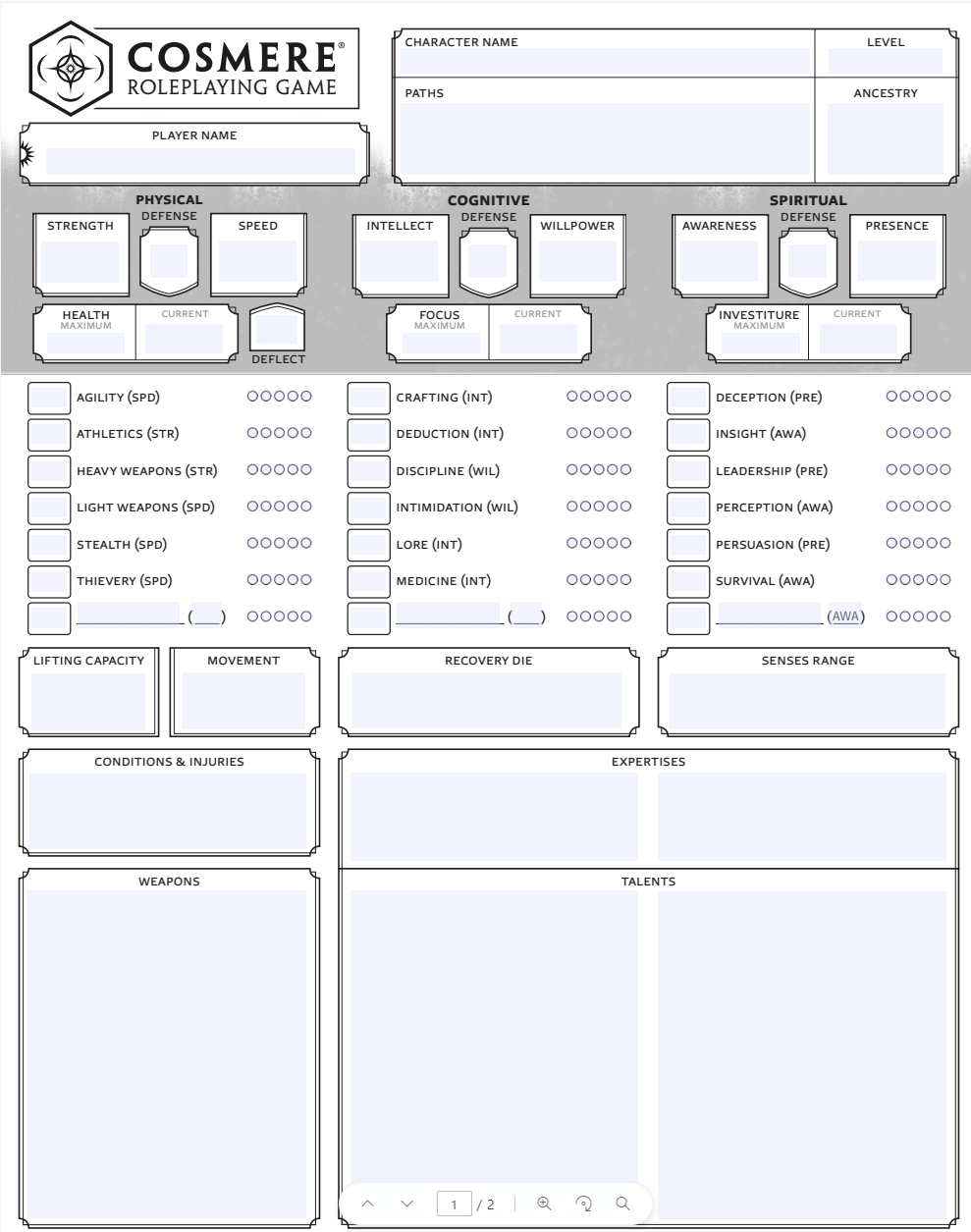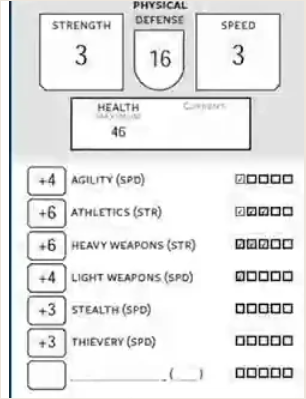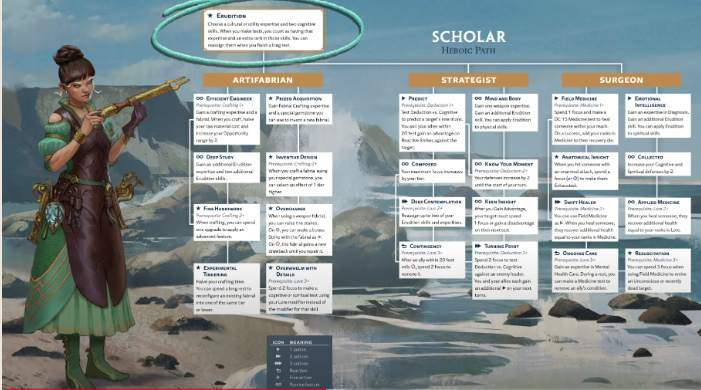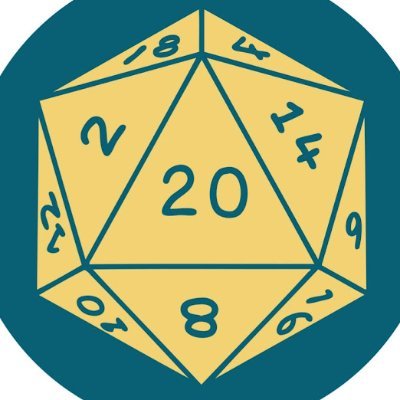
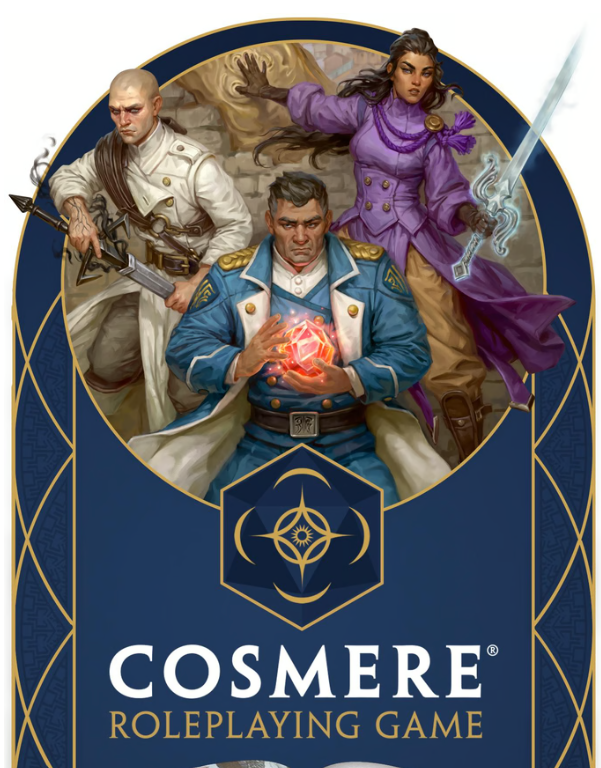

Overview
The Cosmere, by Brandon Sanderson, is being turned into a TTRPG with both new and familiar design elements. There are interested choices, and highly thematic concepts in this game
- Familiar
- Utilizes a lot of mechanics you love, but in different ways that are fresh
- Flexible
- The character design, and the narrative features lend this game a lot of flexibility, while still allowing it to be tactical
- Tactical
- There is a nice mix of actions that you can utilize on your turn, and choices for spending resources

Resolution Mechanic
d20 Roll Over + Attribute + Skill
Plot Die - d6 = 2 faces give opportunies, 2 faces give complications
- Opportunity - max damage, aid ally, influence the narrative, regain 1 Focus
- Complication - reverse
2 sides of complication give bonus - +4, +2
Character Design
Ancestry/Race/Kin
Human or Singer. There are lots of subsets for the Humans on Roshar. You can be Alethi for instance
Attributes
Awareness Intelligence Presence Speed Strength Willpower12 points - split up however with no more than 3 in a stat
- Strength & Speed = HP
- Intellect & Willpower = FOCUS
- Awareness & Presence = INVESTITURE
Skills
Skills are listed under each pairing of Attributes: Physical, Mental, Spiritual. Weapons are also skills. Each skill has ranks, and you add these ranks to the particular attribute to get your full Skill bonus.
- 2 ranks of Athletics + Strength of 3 = +5 when rolling Athletics.*
Expertise - Is an interesting concept also. It unlocks other aspects of weapons or skill abilities
Class / Profession
Agent Envoy Hunter Leader Scholar WarriorThis system utilizes path based abilities. There are a lot of options.
Below you will see 6 different Professions, and each one has different tech trees/ or paths. There are no limitations to the mixing and matching of these Paths and abilities
- Agent - Spy, Investigator Thief
- Envoy - Diplomat, Faithful, Mentor
- Hunter - Tracker, Archer, Assassin
- Leader - Champion, Officer, Politico
- Scholar - Surgeon, Artifabulan, Strategist
- Warrior - Duelist, Soldier, Shardbarer
Abilities/Power/Feats
Talents within the different Specializations (tech trees) are considered your abilities.
Combat
Initiative
Fast and Slow TurnsThis game uses a system similar to Shadow of the Demon Lord. You have fast and slow turns for the players, and fast and slow turns for the enemies. If the players want to go fast they have to sacrifice 1 of the actions for the turn.
- Fast Turn - players (2 actions)
- Fast Turn - enemies
- Slow Turn - players (3 actions)
- Slow Turn - enemies
Turns / Rounds
The game utilizes side based initiative that are divided up into the different Fast and Slow groupings. If you have 3 players that all chose Slow Turns they can decide amongst each other who goes first.
Action Economy
On your turn you get 3 Actions that you can spend how you feel (if you chose a Slow turn).
No action can be repeated
- Brace - Disadvantage weapon (need to be near cover)
- Disengage - move away no Opportunity Attack against you
- Gain Advantage - adv on next test (different skill than the test)
- Interact
- Free - banter, drop, talents
- Movement - can't move then act then move
- Strike - can do another attack if you have off-hand weapon but costs 2 Focus
- Use Skill
- Grapple - 2 Actions
- Ready Action - 1 Action + # Actions of readied thing
- Recover - 2 Actions to get benefits of Short Rest 1x per scene
- Shove - 2 actions
You also get 1 Reaction during the round. These can be used in different ways.
- Aid after they make skill check (attacks are one) - 1 Focus point
- Avoid Danger - agility vs the attack value (might slow down combat). GM has to always verbalize what was rolled
- Dodge - Dis to enemy attack - Focus 1
- Reactive Strike - Opportunity Attack
Attack Mechanic
On your turn you will roll 1d20 + Attribute Modifier + Weapon Skill. You need to get over a Difficulty Rating of some sort based on the monster. You also roll your Damage Die and the Plot Die (when applicable) at the same time.
If you miss, you can opt to still do the damage of the die by spending 1 Focus. Otherwise you would miss entirely and do no damage.
If you hit then you would do the full damage + your Attribute Modifier in damage.
Defensive Mechanic
You have 3 different defensive stats for the different pairings of Attributes: Physical, Mental, Spiritual. The enemy is trying to roll OVER this number to hit you.
Armor is used to deflect damage, or negate it.
Modifications to Resolution
The major conditions in the game are Injuries. If you are taken to 0 Hit Points you then roll for an injury. Injuries then start to stack. When you roll for an injury lower is worse on a D20, but if you ARE injured already it will modify your roll
- Generic Injury = (-5)
- Serious Injuries = penalties in game + (-5) A death chance occurs if you roll an injury check and the result is (-6). So you would need a lot of injuries already.
Conditions
The main modification is using Advantage/Disadvantage. The unique thing about this is that you choose which die to add it to prior to the roll.
- Attack Die
- Damage Die
- Plot Die Whichever of these you choose you would roll two of and take the higher.
Resource Management
Rest Mechanic
Short Rest = Recovery Die. You roll this particular die and whatever the result you can split up in between your HP and your Focus. Full Rest = full everything
Resource
There are three resources in this game.
- Physical resource - Hit points, your health
- Mental resource - Focus, your ability to do cool maneuvers and things
- Spiritual resource - Investiture, your ability to power magics
Health & Dying
See about with the discussion about conditions.
Character Sheet
